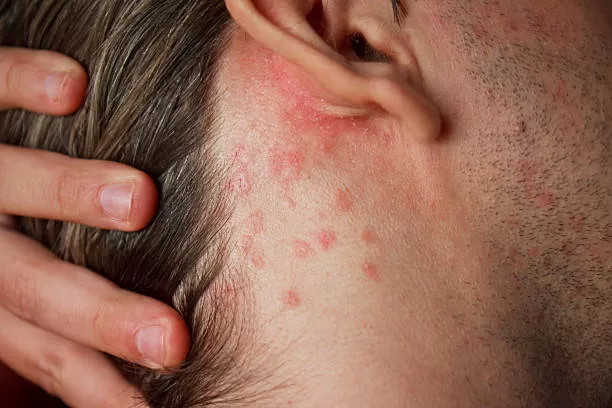Psoriasis is a disease of the skin that makes one develop an itchy rash and scaly patches. Mainly, this illness affects the knees, the elbows, the trunk, and the scalp. So, the infection is an autoimmune condition.
Causes
- Emotionally being stressed.
- An infection such as streptococcal.
- An injury on the skin injury such as cuts or surgery.
- Some medications for instance lithium or beta-blockers.
- Changes in your body temperature as a result of weather changes.
- Smoking and being exposed to secondhand smoke.
- Also, heavily consuming alcohol.
- Rapid withdrawal from injecting or oral corticosteroids.
Can Psoriasis be transmitted from one person to another?
So, Psoriasis is not contagious and cannot be transmitted even after coming into contact with an affected person’s skin.
Types of Psoriasis
- Nail – The type affects the finger and toenails. It causes indentation or pitting, abnormal growth of the nails, and discoloring. It may also loosen the nail separating it from the bed. In a Severe case, the nail may crumble.
2. Guttate Psoriasis– However, this type of psoriasis mostly affects young adults and children. Bacterial infection for instance strep throat is a triggering agent to this type. One develops drop-shape scaling spots on the legs, trunk, or arms.
3. Inverse– The type mostly affects the skin folds of the groin, breasts, and buttocks. One gets smooth patches of swollen skin that become worse when there is friction and sweating. This type may be triggered by fungal infections.
4. Erythrodermic– Erythrodermic is the least common type among all. However, the infection can cover the whole body with a peeling rash that is itchy or burn intensely.
5. Pustular– Also a rare type that brings about clear pus-filled blisters. It may affect small areas of your palms or spread widely.
6. Plaque– This is the most common type of all. It causes dry, itchy, plaques covered with scales. It affects the knees, elbows, lower back, and scalp. It causes patches that vary in color depending on your color.
- Lou Retton age, family, children, husband, career, net worth.
- Todd Strain Bio, Wiki, NBC7-KNSD, Age, Education, Family, Children, Wife, Net Worth, and Career
- Ian Gomez Bio, Wiki, The Great American Baking Show, Age, Education, Height, Family, Wife, Children, and Career
- Keith Jefferson age, wife, children, career, Django.
- Miranda Lambert bio, age, husband, children, career, net worth.
- Mike Lindell age, wife, children, current life, net worth.
- David Robinett Bio, Wiki, KTAB News, Age, Education, Family, Children, Wife, Net Worth, and Career
Signs and symptoms

- Patchy rash which varies in appearance from person to person may be spots of dandruff-like scaling to other major eruptions.
- Rashes whose color varies depending on your skin color. This may tend to be shades of purple with gray scales on black or brown skin. However, for white skin, it may be pink or red with a silver scale.
- Scaling spots.
- Drying, and cracking of the skin which may be bleeding.
- Itching and soreness of the affected area.
- Cyclic rashes.
Treatment
So, the most common treatments for the infection are;
- Steroid creams.
- Vitamin D3 ointment.
- Moisturizers for dry skin.
- Lotions and shampoos that are medicated.
- Vitamin A creams.
- Also, the medication that may help in slowing skin cell production.
Does Psoriasis have a cure?
Psoriasis is an autoimmune illness. Therefore, it has no cure.
- Kenya Medical Training College, courses, requirements.
- Mount Kenya University history, fees, courses
- List of Accredited Private Universities in Kenya
- List of best private primary schools in Kirinyaga County.
- Kenya Institute of special education, courses.
- Bay head elementary school history, enrolment, programs offered.
- Public Universities in Kenya